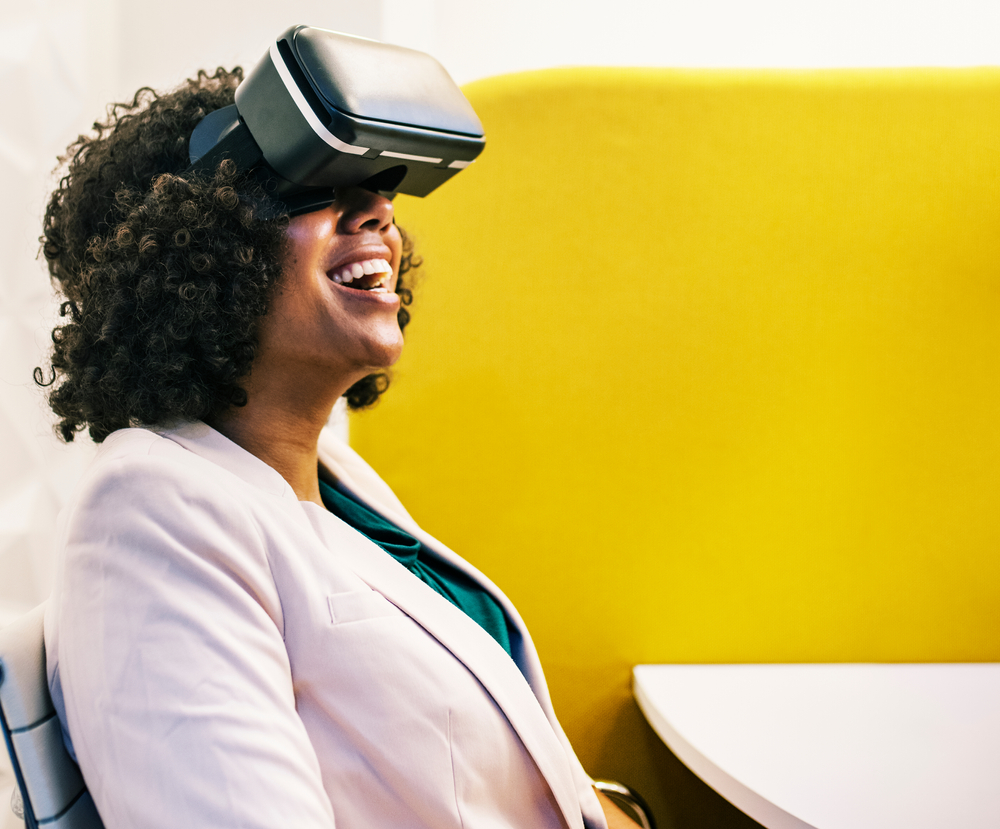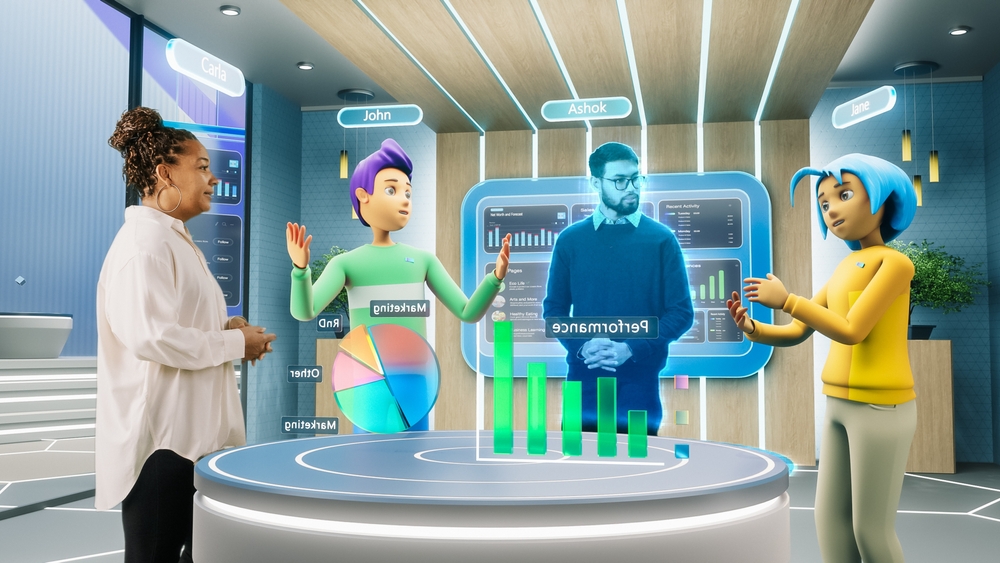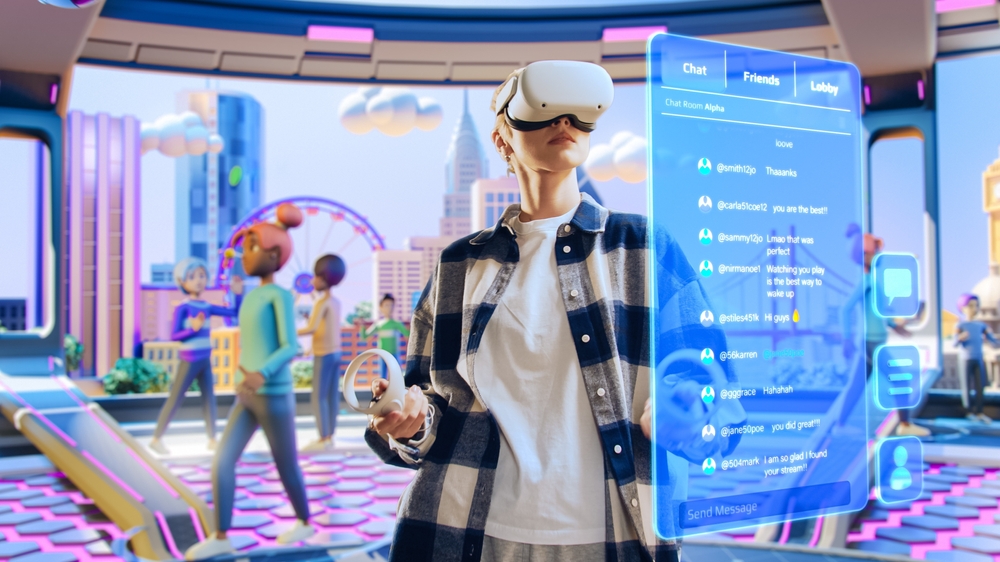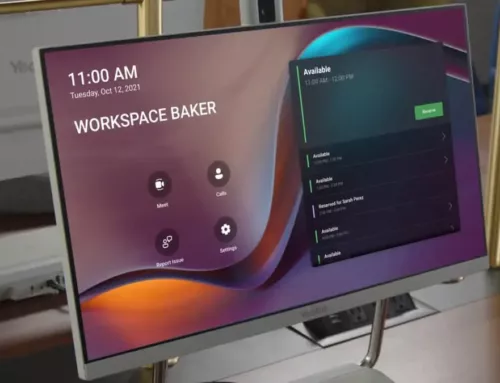Here at Ultimate Technologies Group, we love all things virtual reality and augmented reality-related.
We like to stay up-to-date on any new technology releases or updates, and as the VR industry continues to expand, our company can’t help but smile.
However, even though VR is becoming more common, many people in the workforce are having trouble wrapping their minds around a completely virtual meeting style. VR is a little more virtual than Zoom or Microsoft Teams, and this leaves many people wondering: what will it be like? How does it work? Is it actually as useful as the advertisements say?
All of these questions will be answered in this blog post.
Read on to learn more!

What is a Virtual Reality Meeting?
For the newcomers, a VR meeting takes place in a digitally-rendered world or space where humans can interact with each other, or other programs in the VR headset.
The difference between a VR space and something like a videogame is that VR headsets immerse users into the virtual world. They can see, touch, manipulate, and engage with various elements in the digital world, whereas a videogame is pre-designed to only have a certain amount of activities for the user to do while only being immersed through the playable main character.
Most VR technologies are wearable, meaning that the user will feel more situated in the virtual world of their choosing. Humans have a natural sense of spatial awareness, and the sensors inside of a VR headset take advantage of this to give a seamless, immersive feel.
In regard to a VR meeting, attendees would meet in an online meeting room similar to Zoom, however, it’s much more interactive.
Participants can move around, work, collaborate, and brainstorm with one another via a VR headset. The headset makes it feel as though everyone is in the physical presence of one another as if they’re all in the same room, but everyone can be hundreds of miles apart.

What is a Virtual Meeting Room?
Virtual meeting spaces are digital rooms where a meeting “takes place.” Every VR meeting room is customizable for the different needs of each group or organization, and the options can vary depending on what kind of VR tech you’re using.
For example, Horizon Workrooms is the VR workspace owned by Meta. They take a more traditional approach with their VR meeting rooms, displaying large digital conference rooms, large windows with lots of light, and more. This kind of workroom lets users talk, collaborate, write on whiteboards, and edit live documents.
Mark Zuckerberg has already expressed that it will take time to expand the metaverse, and he also says that there will be even more to come for Horizon Workrooms. The platform launched in 2021, so it’s still in its beta stage.
A growing metaverse means that VR meeting spaces may improve more too. Since the metaverse is still a few years away from being massive, there’s really no telling what kind of meeting can be created in the digital world.

What Technology is Beneficial for VR Meetings?
Virtual meeting rooms are only a part of the whole of VR meetings. Participants need to have access to the technology so that they can be “transported” to the virtual space and feel immersed with their coworkers.
In a VR meeting space, each participant is viewed as an avatar. Salespeople and businesspeople argue that avatars can hide crucial facial expressions during a discussion, but right now it’s safe to say that any meetings dealing with large amounts of money are likely to remain in person until new VR technologies arise.
Additionally, these VR avatars give the user full control of their body, allowing them to move around in VR space or simply move their limbs in whatever way they prefer. However, you need a headset and other VR technologies that are specifically fitted to a given person.
Thankfully, most VR experiences nowadays only require you to have a headset. They have also become far more compact over the years, making them more comfortable and easy to transport.
VR workrooms depend on the brand of VR technology the participants are using. Some of the options we like here at Ultimate Technologies Group are the HoloLens 2 by Microsoft or the Oculus headset offered by Meta. Both headsets require the user to wear them around the face and look through internal lenses.
Touch controllers can come with your VR headset to make it easier to navigate through a virtual space. They can act as your hands and legs for the most part, and they also can create a virtual boundary so you don’t go outside of your designated meeting space or bump into objects as you move around your room.
There are many doors that can open with VR headsets and VR meeting spaces. If you have any questions about VR headsets or VR meetings, contact an Ultimate Technologies Group representative today!



